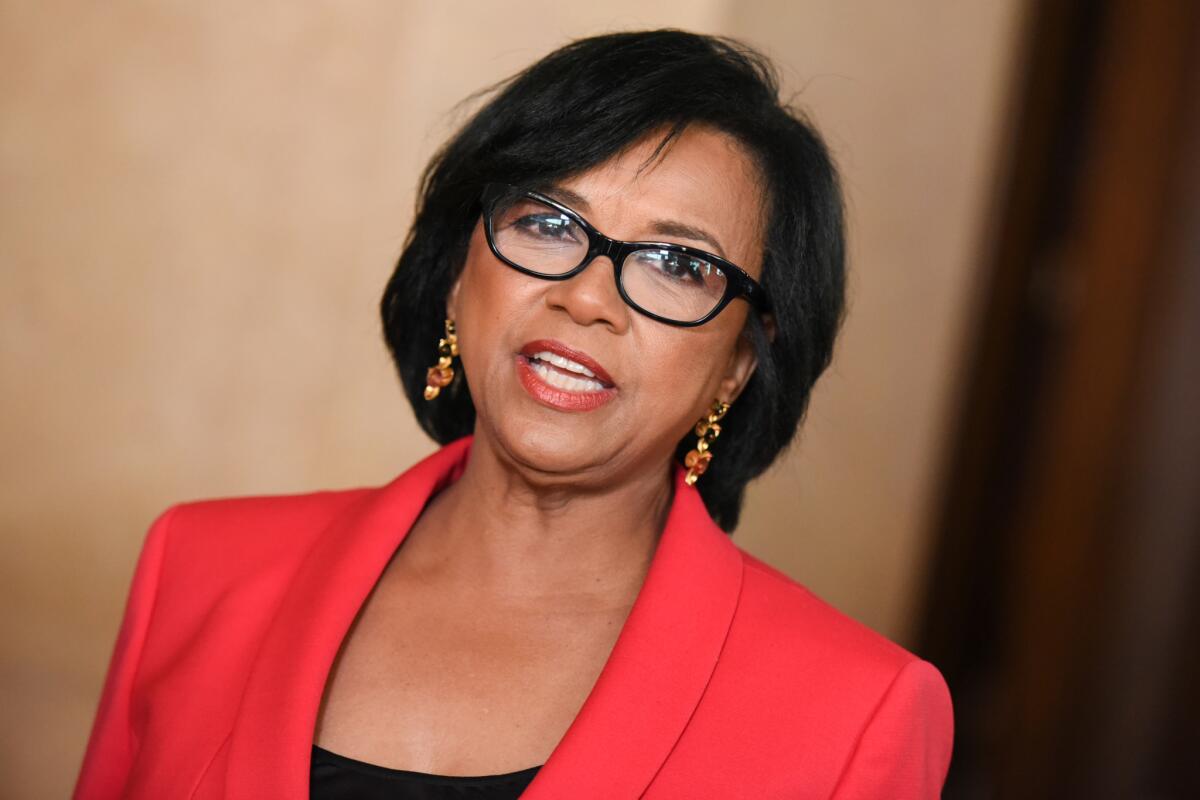Here’s what the academy may do about the #OscarsSoWhite boycott

Academy of Motion Picture Arts and Sciences President Cheryl Boone Isaacs arrives at the ICG Publicists Awards in Beverly Hills on Feb. 20, 2015.
The Academy of Motion Picture Arts and Sciences will weigh new rules intended to encourage more diversity among its membership and its nominations, The Times has learned.
The academy’s 51-member Board of Governors has added the diversity issue to the agenda for its regularly scheduled meeting Tuesday night in response to an outcry over an all-white slate of acting nominees for the second year in a row, according to a person briefed on the matter.
#OscarsSoWhite: Full coverage of the boycott and Hollywood’s reaction
Among the options the board could choose are expanding the number of films in the best picture category to 10 every year, expanding the number of acting nominees in each category and changing the way the academy invites new members by allowing prospective members to put themselves forward, rather than waiting to be asked.
Academy President Cheryl Boone Isaacs issued a statement Monday night promising that the organization was making “big changes” and taking “dramatic steps to alter the makeup of our membership.”
Her statement followed pledges by director Spike Lee and actress Jada Pinkett Smith to stay home from the Oscar telecast on Feb. 28, and calls for a boycott of the show online.
Typically the academy waits until spring -- months after the telecast -- to institute major rule changes, but the homogeneity of this year’s nominees has provoked an uproar that threatens the image and the financial health of the organization. If a boycott gains traction and hurts TV ratings for the show, it could affect the sales of television rights, which constitute the academy’s primary source of revenue.
For the last three years, the awards body has been in the midst of a push for more diversity, inviting larger and demographically broader groups to join its 6,261 voting members, and in November, Boone Isaacs announced a new initiative, called A2020, intended to diversify the staff of the organization. But given the size of the academy, and the fact that members belong for life, any change to the organization’s overall demographics has been incremental.
Another change the board could make at Tuesday’s meeting would be to cull its rolls of members who haven’t actively worked in the film industry for a period of several years.
Though that change would likely inspire howls of outrage from the group’s older members, it was the approach then-academy President Gregory Peck took in 1970 in response to criticism that the organization was out of touch with changes in the industry.
Last year, when the academy nominated an all-white group of actors, passing over a critically praised performance by David Oyelowo in “Selma,” it inspired the trending hashtag #OscarsSoWhite. But awards watchers said much of the blame belonged with the studios greenlighting films, who had given minority actors precious few roles to begin with.
This year, when the academy failed to nominate “Straight Outta Compton” for best picture, and overlooked performances by black actors including Idris Elba, Will Smith, Samuel L. Jackson and Michael B. Jordan, the controversy heightened, with some activists calling for Oscar host Chris Rock to step away from his duties.
Boone Isaacs, in a statement, described herself as “heartbroken and frustrated by the lack of inclusion.”
ALSO
‘Clueless’ actress Stacey Dash: ‘There shouldn’t be a Black History Month’
Spike Lee clarifies his Oscars stance: ‘I have never used the word boycott’
‘Aunt Viv’ blasts Will Smith and Jada Pinkett Smith over Oscars boycott
Jada Pinkett Smith to boycott Oscars: ‘Begging for acknowledgement ... diminishes dignity’
More to Read
From the Oscars to the Emmys.
Get the Envelope newsletter for exclusive awards season coverage, behind-the-scenes stories from the Envelope podcast and columnist Glenn Whipp’s must-read analysis.
You may occasionally receive promotional content from the Los Angeles Times.








